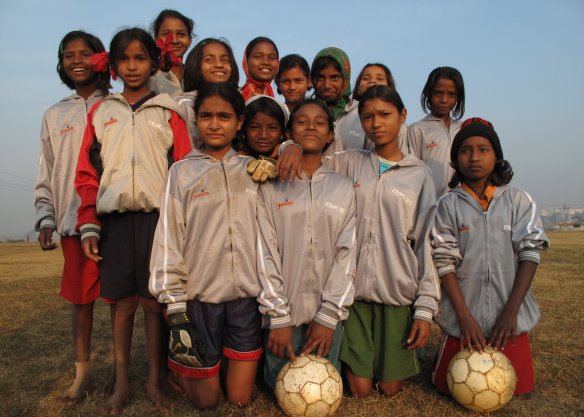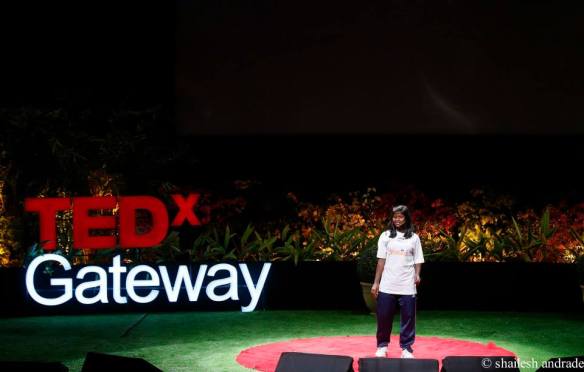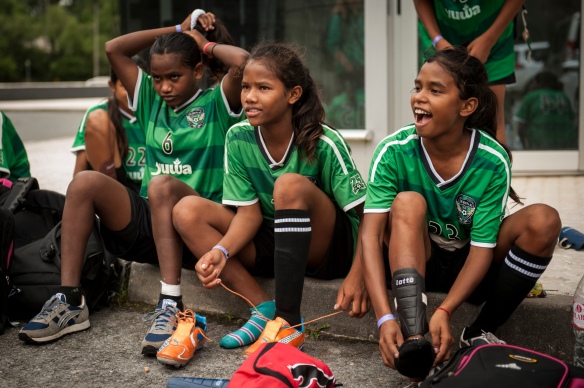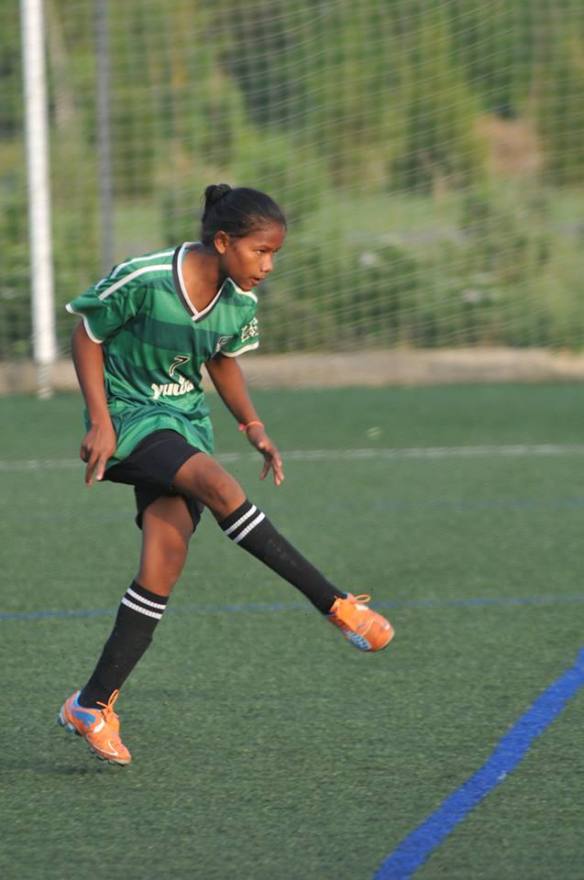Last month, I was a witness for a Yuwa girl as she gave a police statement about an incident of harassment and attempted theft. To collect this girl’s statement, twelve detectives and officers rolled up to Hutup village in two police-issue jeeps, wielding AK-47’s. It seemed absurdly over-the-top for the case in question, but I was still happy that a case of harassment was being formally addressed. These things are often shrugged off as nothing.
As the girl finished giving her statement, the head detective turned to me asked me if I was married. Then he carefully spelled out my name on the statement as a witness:
Kumari Rose Thomson
Kumari is a title that means unmarried girl. After I signed the document, the detective asked me for my father’s name, so he could write it under my name. If I had been married, my husband’s name would have gone in that place.
It seems that as a woman, I have no legitimacy without the addition of the name of my male keeper. I’ve been in rural India long enough that this irritating formality didn’t surprise me—but it was still felt like a slap in the face. It’s as if girls and women can’t own their own lives.
Kumari, Kumari, Kumari
Kumari is the last name shared by the vast majority of girls in the villages of Jharkhand. After marriage, girls change their last name from Kumari to Devi: a title that signifies that a woman is married.
If you took a Yuwa team roster that consisted exclusively of last names the list would read: Kumari, Kumari, Kumari, Kumari, Kumari…. Endless Kumari. This led for some confusion at the tournaments in Spain, where it had to be clarified that No, the girls in Yuwa are not all related.
The use of the title Kumari is a constant reminder of the life path expected of girls in villages. Many parents believe that higher education, or anything beyond 10th standard[1], is pointless for their daughters. Why invest in education when the girl will get married in her mid to late teens? Why waste money on school when the girl’s future is to be a wife and a mother? For a family that struggles to feed all its children, it makes financial sense to prioritize a son’s education.

For a woman without education, temporary construction work is one of the few options available for supporting her family.
A girl is rarely asked about her own dreams for the future. Her future is not her own. The girl belongs to her family—until the day that ownership is transferred to her husband and in-laws.
Unexpected consequences
As a state, Jharkhand is notorious for its high rates of child marriage. In Hutup village, I meet young women my own age who have two or three children. Many of the girls in Yuwa have older sisters who were married off before age eighteen. Because I see the girls of Yuwa everyday, however, I’ve come to think of them as exceptions to this cultural norm. I see them as immune outliers who bravely defy expectations. I forget that early marriage is still a very real threat for them.
After returning from the trip to Spain, the Yuwa football players became local heroes. These girls are the only people around who have flown in an airplane or traveled to a different country. As Kusum explained in her Tedx talk, after the trip abroad, “Everyone in the village knew us. Everybody knew my name. Everyone says girls in Yuwa are doing very good things.”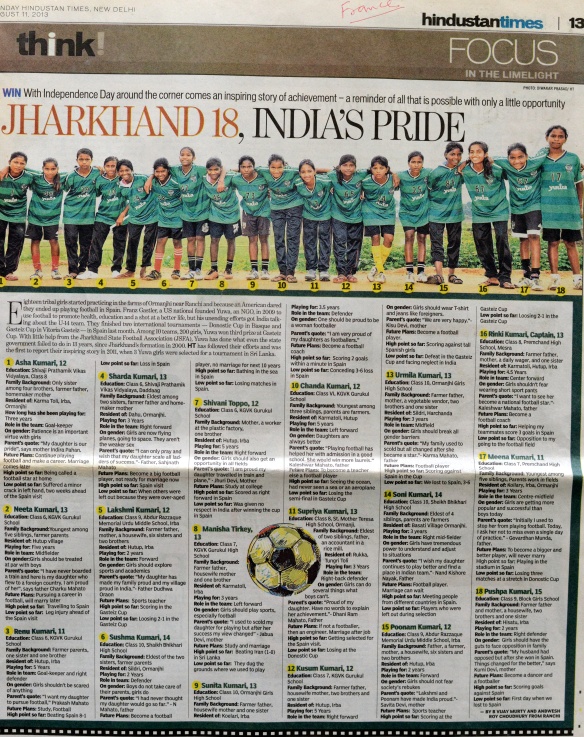
 With the media attention and visits from big-shot politicians looking for good photo ops, the girls did more than just gain respect for their unconventional passion for football. These 13- and 14-year-old girls became attractive potential brides.
With the media attention and visits from big-shot politicians looking for good photo ops, the girls did more than just gain respect for their unconventional passion for football. These 13- and 14-year-old girls became attractive potential brides.
Yuwa’s full-time Female Mentor, a young woman from Jharkhand named Neha, meets with player’s parents regularly to discuss the girls’ futures. Some mothers revealed that in the wake of the trip to Spain, men have approached them with offers of marriage for their daughters.
One mother, a widow, told Neha about a marriage offer that came for her 13-year-old daughter from an older man in the army. Her extended family pressured her to accept the proposal because the suitor had a stable job and could offer financial security. She refused because she knows her daughter has different dreams.
Another mother told Neha about a tempting proposal that came from a man working for a computer company. Again, this offer promised the sort of financial stability which parents in villages dream of. This mother refused the proposal, even though in the past she has married off her other girls in their mid-teens.
When asked about her rejection of the proposal, she explained,
“My daughter is a very different kind of girl. Sometimes I don’t know what to do with her. But I will support her in what she wants to do. I knew she would be very angry about the marriage offer, so I didn’t tell her. She wants to continue her education.”
Rewriting the script
A few weeks ago, I watched a team of 11- and 12-year-old Yuwa girls draw pictures of the woman they want to become. The final result was a winsome hodge-podge of teachers, police officers, “doctys” (female doctors), and bankers. This typical kids’ activity has a much more significant impact in this village, where the script for girls has already been written. There’s a novel message being reinforced again and again, every time a girl meets with her Yuwa team, six days a week, year-round: You can take charge of your life.
The senior girls of Yuwa who have already rejected offers of marriage are living proof of that message for the younger players. They speak up to their parents about their goals, excel at school, and seize the opportunities in front of them. They report incidents of abuse and harassment in their villages, school, and homes because they know their own rights. These girls shake up the system and it upsets the bitter, beaten people who cling to it.
It is not easy.
But the little girls look up to these players and see the message in their actions. This is your body. This is your voice. This is your life. Own it.

One of the state’s highest level police officers, Sampat Meena, visiting Yuwa to tell her story. Girls asked how to become officers themselves, how to protect themselves from boys and men who harass them in their villages, about their right to get married when they want, and how to prevent their parents from sending them to live at places they don’t want to be.
Last week, I introduced one of the senior team captains to a visitor. “This is Sabitri Kumari,” I said as they shook hands.
Sabitri immediately made a face and shook her head. Then she corrected me with smile.
“No Kumari.
Sabitri.
Just Sabitri.“
[1] Sophomore year of high school, for those of you in the US.

















